Rocket Attack Targets US Base In Northeast Syria
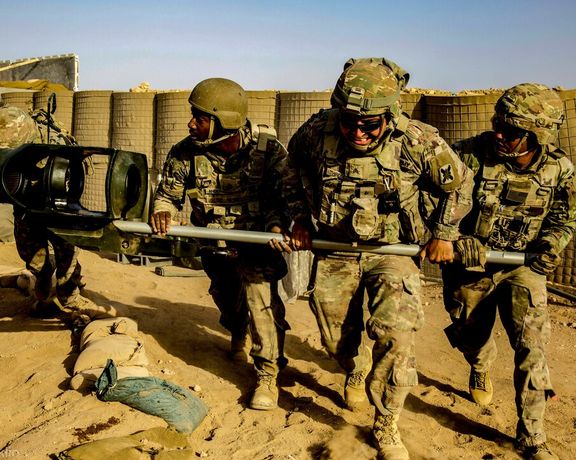
The US military's Central Command says a rocket attack has targeted coalition forces at the Green Village base in northeast Syria.

The US military's Central Command says a rocket attack has targeted coalition forces at the Green Village base in northeast Syria.
CENTCOM said in a statementSunday that no US or coalition troops were killed or wounded when two rockets hit the base, adding that there was no damage to the coalition infrastructure or equipment.
According to the statement, US forces are investigating the incident, but there are no claims of responsibility yet.
The Islamic Republic and its proxy militia groups that provide military support to Bashar al-Assad's regime in Syria are known for targeting US bases in Iraq and Syria.
Such attacks reached a crescendo in December 2019, before the United States decided to take out the commander of Iran’s extraterritorial Quds Force, Qasem Soleimani.
On January 3, 2020, the US military, on the order of President Donald Trump, killed Soleimani in a drone strike near Baghdad International Airport, saying that he had been "actively developing plans to attack American diplomats and service members in Iraq and throughout the region."
Several hundred American soldiers are stationed in the north and east of Syria as part of the international coalition against ISIS.
In recent years, the coalition bases have been sporadically targeted by rockets or drones.
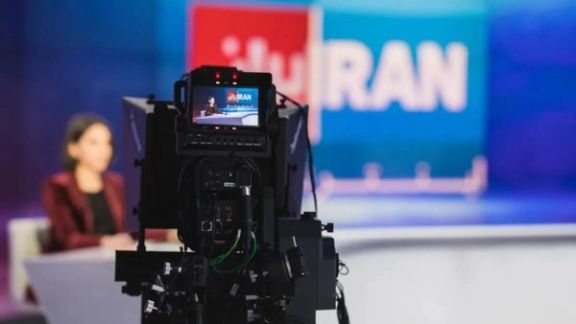
The announcement by Iran International TV that about shifting studio operations to Washington DC over Islamic Republic’s threats have solicited worldwide reactions.
After a significant escalation in state-backed threats from Iran and advice from the Metropolitan Police, Iran International TV announced February 18 that it has reluctantly closed its London studios and moved broadcasting to Washington DC.
The head of Counter Terrorism Policing (CTP), Assistant Commissioner Matt Jukes in London confirmed that they will continue to work closely with intelligence partners and others to investigate potential threats projected from Iran against a number of UK-based individuals, support those affected and put in place measures to keep them safe, including protective security measures such as an overt armed policing presence focused around the west London offices of the Persian-language media company.
“At its sharpest, this has involved police and MI5 working together to foil 15 plots since the start of 2022 to either kidnap or even kill British or UK-based individuals perceived as enemies of the regime,” read the statement.
Jukes added that in light of the ongoing investigation that follows the arrest of a man last weekend in that area, and despite extraordinary security measures, “we still have serious concerns for the safety of people working at this company,” referring to the arrest and charging of Austrian national Magomed-Husejn Dovtaev, 30, with allegedly “collecting information of a kind likely to be useful to a person committing or preparing an act of terrorism” at London’s Chiswick Business Park, home to the offices of Volant Media UK Ltd., the owner of Iran International.
“This news may also be of concern to members of the wider Iranian diaspora in the UK. If anyone has concerns over their own safety or the safety of somebody else, then they should contact their local police force,” the statement added.
But there were also some questions about why Britain would advise a media outlet to move out of London because of threats by a rogue state and if the move means giving in to threats. A former US State Department advisor, Gabriel Noronha tweeted: What on earth is “freedom of the press” good for if UK authorities won’t protect their own journalists from hostile states? This is the BASIC duty of a government!
The story has been widely covered by many media outlets, including The Sunday Times, Sky News, The Guardian, Daily Telegraph, Evening Standard, and LBC London radio, as well as several German and French papers and new websites.
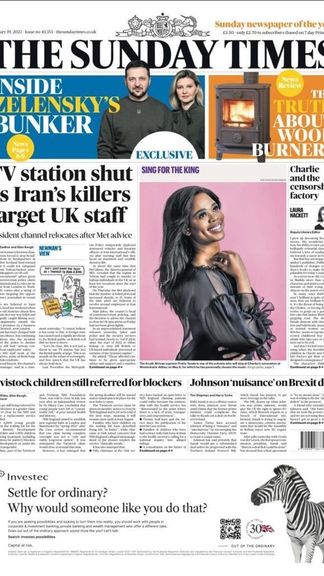
In an interview with BBC after the decision to move broadcasting to Washington, Mahmood Enayat, General Manager of Iran International TV, said, “I cannot believe it has come to this. A foreign state has caused such a significant threat to the British public on British soil that we have to move. Let’s be clear this is not just a threat to our TV station but the British Public at large. Even more this is an assault on the values of sovereignty, security and free speech that the UK has always held dear... We refuse to be silenced by these cowardly threats. We will continue to broadcast. We are undeterred.”
Iran International was warned by authorities in November that its journalists were under threat from Iranian agents and the Metropolitan Police took measures to strengthen security around the network’s office in the area.
The channel's broadcasts have gained special significance since popular anti-regime protests have swept Iran since September after the death of Mahsa Amini detained by the country’s "hijab police.” Iranian officials have repeatedly threatened Iran International and other Persian broadcasters based abroad since the start of protests when the government blocked the Internet to deny the population news and information. Iran’s Intelligence Ministry describes the channel as a “terrorist organization.”
“Its operatives and affiliates will be pursued by the Ministry of Intelligence,” Intelligence Minister Esmail Khatib said in November. “And from now on, any kind of connection with this terrorist organization will be considered to be tantamount to entering into terrorism and a threat to the national security of the Islamic Republic of Iran.”
In the same month, the broadcaster said the Metropolitan Police warned that two of its British-Iranian journalists faced threats from Iran that “represent an imminent, credible and significant risk to their lives and those of their families.”
Amid repeated threats by the Islamic Republic against Iran International’s reporters, the UK government vowed in December to step up protection of London-based Iranian journalists.
British Foreign Minister James Cleverly had vowed during a session in Parliament on December 13 that the Foreign and Commonwealth Development Office (FCDO), in partnership with the Home Office, had ensured that the Iranian journalists were protected by the British police.
“The UK remains absolutely determined to ensure that Iran does not intimidate people within this country. We will always stand up to the aggression from foreign nations,” he noted, adding, “We will absolutely not tolerate threats, particularly towards journalists who are highlighting what is going on in Iran, or indeed any other individual living in the UK.”
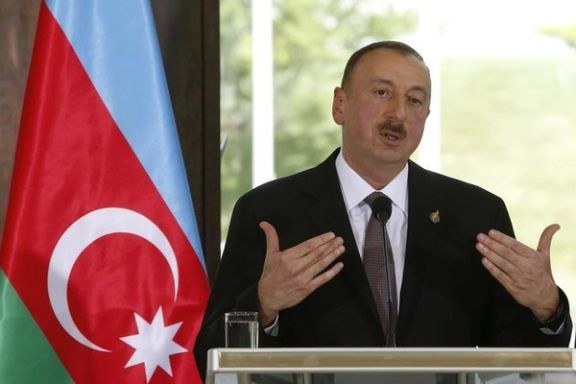
President of Azerbaijan Republic says entities related to the Iranian government were involved in the armed attack on the country's embassy in Tehran last month.
Speaking to reporters on the sidelines of the Munich Security Conference on Saturday, Ilham Aliyev said “normalization of relations with Iran depends on a transparent investigation that will bring the perpetrators (of the attack) to justice."
In an armed attack by an Iranian citizen on the embassy of the Republic of Azerbaijan on January 27, the head of the embassy's security was killed, and two other security staff were injured.
A day later, Baku evacuated its diplomatic staff and their families from the country and then suspended the activity of its embassy in Tehran. However, the relations between the two countries have not been interrupted and the Iranian embassy in Baku continues to work.
In his first criticism, Ilham Aliyev said the police's lack of swift action to stop the gunman and the fact that the state television interviewed the assailant immediately after his arrest showed he was sent "by some organizations of the Iranian regime."
The Islamic Republic says it has arrested the attacker, but it avoids “getting into a rush” in the case.
Tehran claims the gunman appeared to have had a personal, not a political, motive, but the Republic of Azerbaijan insists there is enough proof for this attack to be considered a terrorist act.
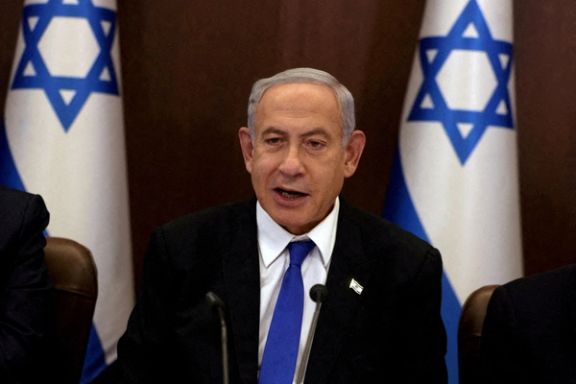
Israeli Prime Minister Benjamin Netanyahu on Sunday said that Iran was responsible for a reported attack on an oil tanker last week.
An attack on the Liberian-flagged Campo Square was confirmed on Saturday by the ship's captain, who said it was lightly damaged by an airborne object on February 10 while sailing through the Arabian Sea.
Shipping databases linked the tanker to Zodiac Maritime, which is controlled by Israeli shipping magnate Eyal Ofer.
"Last week Iran again attacked an oil tanker in the Persian Gulf and harmed the international freedom of navigation," Netanyahu said at a weekly cabinet meeting.
Regional defense and security sources have said they suspected the assault was carried out by Iran, which did not comment on the incident.
Tehran has rejected accusations it was behind similar attacks in the past few years.
British maritime security company Ambrey Intelligence said unmanned aerial systems had attacked two tankers and one bulk carrier in the Arabian Sea and assessed that Tehran had mounted the attack. Two of the merchant vessels were Israeli-owned and one was Emirati, it said.
The attack came during antagonism between Iran and the West over Tehran's nuclear activity and its supply of arms - including long-range "suicide drones" - for Russia's war in Ukraine, as well as months of anti-government demonstrations at home.
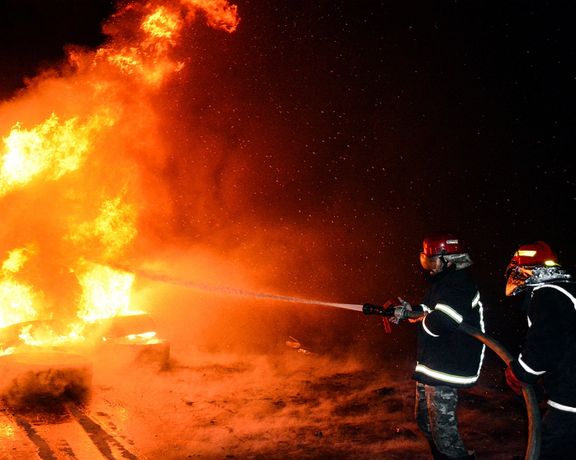
Iran’s foreign ministry condemned an Israeli rocket strike Sunday on “a residential area” in central Damascus, and the “martyrdom of several civilians.”
An Israeli rocket strike early on Sunday hit a building in central Damascus's Kafr Sousa neighborhood near a large, heavily guarded security complex close to Iranian installations, killing five people, witnesses and officials said.
Iran's foreign ministry spokesman Nasser Kanaani condemned the attack, which he likened to recent attacks by ISIS in Syria.
The rare, targeted strike damaged several buildings in the densely populated district close to Omayyad square in the heart of the capital, where multi-story security buildings are located within residential areas.
Iranian media reported 5 people killed and 15 injured, according to an early count. The Syrian Observatory for Human Rights reported that 15 people were killed in the attack.
An Israeli military spokesperson declined to comment.
Citing a military source, state media said Israel had carried out air strikes targeting several areas in the capital shortly after midnight, causing five deaths and 15 injuries among civilians, and damage to several residential buildings.
"It caused damage to several civilian homes and material damage to a number of neighborhoods in Damascus and its vicinity," the army said in a statement.
It was not immediately clear whether the strike was aimed at a specific individual.
Pro-Iran Hezbollah's top commander Imad Moughniyeh was killed in 2008 in a bombing in Kafr Sousa, a heavily policed area where residents say several Iranian security agencies are located, including a major cultural center.
Israel has been carrying out air strikes against suspected Iranian-sponsored weapons transfers and personnel deployments in next-door Syria since 2017. Iran has expanded its military presence in Syria in recent years and has a foothold in most state-controlled areas, with thousands of members of militias and local paramilitary groups under its command, Western intelligence sources say.
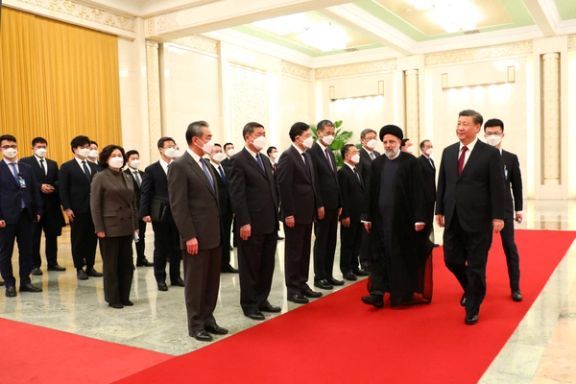
Islamic Republic's hardliner officials and media say President Ebrahim Raisi’s state visit this week to China “defeated the project to isolate Iran”.
“The Iranian president’s visit to Beijing was made at a time when western powers, with the help of some misled elements, were trying to isolate Iran in the international community. This visit ruined the enemies’ plans and defeated the project of isolating Iran,” Moslem Salehi, a member of the parliament’s economic committee told the official news agency (IRNA) Saturday.
Moslemi also said Iran can “challenge the unilateralism of the United States” as an influential country alongside Russia and China and argued that Beijing’s cooperation with Tehran at this juncture is proof of Iran's “political stability”.
As Iran's protest movement enters its sixth month, European powers are increasingly sending strong signals that they no longer consider diplomacy a viable route in their dealings with the Islamic Republic, without fundamental changes in Tehran’s policies.
In the latest development, the Islamic Republic not only lost an invitation to the Munich Security Conference, but also had to witness the presence of the Iranian opposition figures, most notably the exiled crown prince, Reza Pahlavi, who was a speaker at the conference. In an unattributed commentary Saturday, the official news agency (IRNA) slammed the exclusion of Iran, and its strategic ally Russia, from the conference.
Pro-government officials claim that tighter relations with China and Russia will balance out the pressure from the US and European powers. “To counter these pressures we need breathing space to be able to manage the country’s affairs,” conservative former lawmaker Seyed Reza Akrami told Khabar Online.
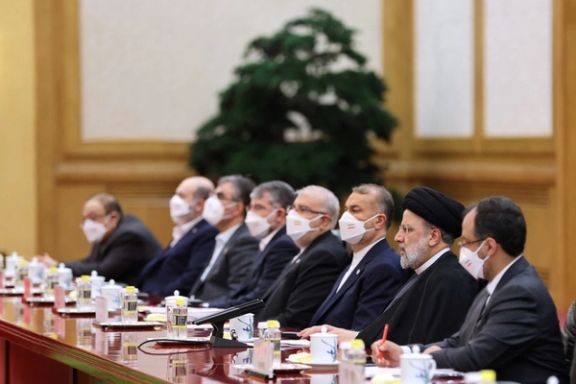
He argued that China’s invitation to the Iranian president was “extremely important” given that Iran has not agreed to the restoration of the 2015 nuclear deal, Joint Comprehensive Plan of Action (JCPOA) or acceded to the conventions of the Financial Action Task Force (FATF) which Raisi and other hardliners have strongly opposed.
Iran has been on the FATF blacklist, along with North Korea, since February 2018 for failing to pass legislation introducing transparency measures designed to combat money-laundering, corruption, and financing of ‘terrorism.’
Many analysts, politicians and former government officials in Iran say that failure to join the FATF is detrimental to economic relations with the world, including Russia and China, as foreign banks would still be wary over transactions with Iran.
According to the head of Iran’s Trade Promotion Organization (TPO) Alireza Peyman-Pak, during Raisi’s China visit the two countries signed “19 documents, contracts, and agreements in the fields of industry, mining, and trade, apart from another 20 major documents” to the tune of 3.5 billion dollars.
However, in a series of tweets on Friday, Hamid Aboutalebi, the political deputy of former President Hassan Rouhani’s office argued that Raisi’s] visit to Beijing would not result in a such a ‘strategic balance’.
In the joint statement of the two presidents, Aboutalebi pointed out, there is no mention of the 25-year Comprehensive Cooperation Agreement signed in 2021. There is also no word about Chinese nuclear cooperation with Iran, the modernization of the Arak heavy water reactor which in 2016 during Jinping’s visit to Tehran, they agreed to advance. Banking and financial cooperation was also not mentioned.
Aboutalebi claimed that China has only agreed to mention the lifting of US sanctions in the joint statement only within the context of reviving the 2015 nuclear deal.
Warning not to pin too much hope on China, he wrote, “So, let’s be aware that [Raisi’s] visit to Beijing will not result in a ‘strategic balance in Iran's foreign relation’.”